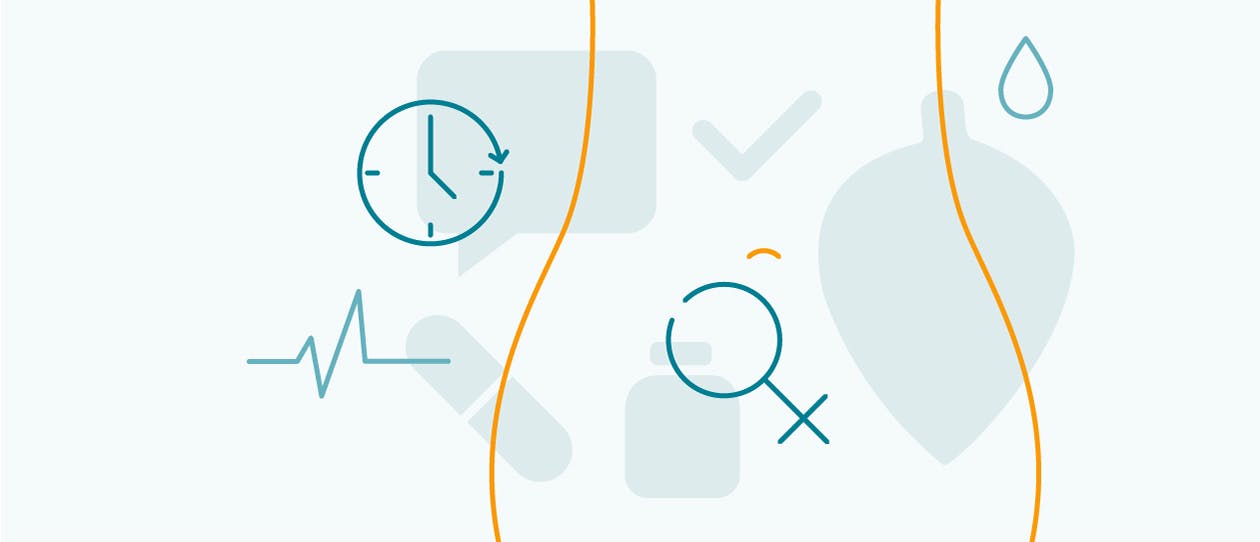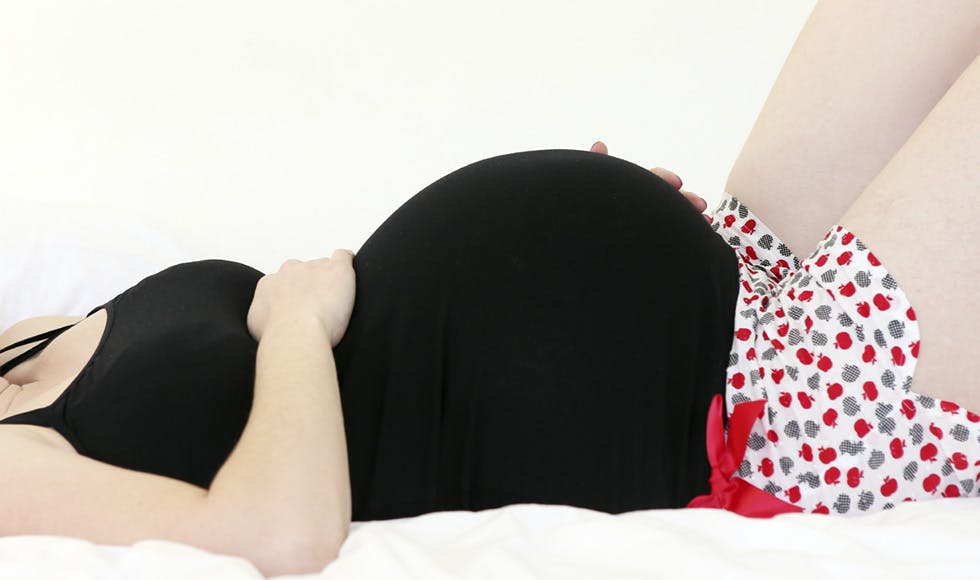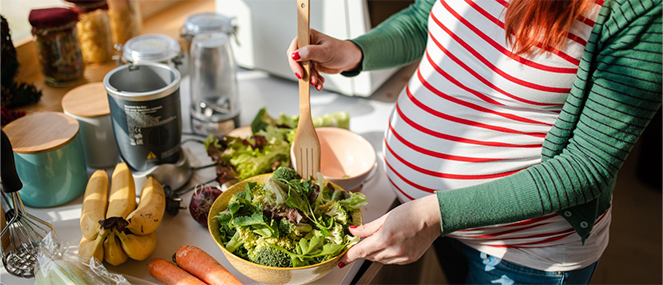
- Health hub/
- Resources for Pregnancy and Preconception/
- Keeping Your Bosy Healthy During Pregnancy


Many women feel healthy and relaxed throughout their pregnancies, while others feel uncomfortable or even unwell. To safeguard your health, your baby’s health and your own peace of mind, talk to your doctor about any unusual symptoms that arise, as well as at the first indication that you may be pregnant
Most women realise they’re pregnant when they miss a period. Other clues that conception has occurred may include breast tenderness, fatigue, nausea, indigestion, and needing to go to the toilet to urinate more often than usual.
Pregnant women are prone to a number of ailments, including:- Morning sickness, which is characterised by nausea and vomiting, mainly in the early stages of pregnancy, usually ceasing around the end of the first trimester. Despite its name, it may occur at any time of day
- Stretch marks, which commonly occur in the last trimester. They tend to affect the abdomen, but may also appear on the thighs, breasts, hips and buttocks
- Iron deficiency
- Varicose veins and haemorrhoids
- Constipation and indigestion
- Abdominal cramping accompanied by spotting or bleeding
- Heavy vaginal bleeding
- Blurred vision that persists for several hours or is accompanied by dizziness
- A high fever
- Pain or burning symptoms during urination
- Sudden marked swelling of the ankles, feet, face or hands
- Persistent severe vomiting
- Significant decrease in foetal movements or a lack of movement of the foetus for eight hours or more (after six months of pregnancy)
Many of the issues faced in pregnancy are due to the hormonal changes the body is going through, while others are due to the physical pressure of the baby on the structures of the body or to the baby’s needs being prioritised over the mother’s. In some cases, a combination of these issues are involved.
For example:
- The cause of morning sickness has not been fully determined, but it may in part be due to the hormonal fluctuations that take place in the early phases of pregnancy , and in particular, high oestrogen levels
- Varicose veins are caused by a combination of hormonally induced changes to the veins, and increased physical pressure
- Anaemia occurs as a consequence of maternal iron stores being diverted to the developing baby. As many women don’t obtain enough iron from their diets prior to conception and during pregnancy, the baby’s needs may cause insufficient iron to be available to the mother
- Stretch marks are a form of scar tissue that forms when the skin is stretched further than it can comfortably manage, causing the elastic fibres of the dermis (the deeper layer of skin) to tear. They tend to develop during the late stages of pregnancy when the baby’s rapid growth puts pressure on the skin over a relatively short period
- Don’t take pharmaceutical medicines or natural remedies of any kind without discussing their suitability with your doctor first. Some preparations should not be used during pregnancy, and others should be avoided in the first trimester
- It is recommended that women planning to become pregnant take a broad-spectrum nutritional formula that’s specially formulated to support healthy ovulation, conception and early-stage pregnancy. Choose a product that contains a broad spectrum of nutrients, including omega-3 fatty acids, coenzyme Q10, biotin, B vitamins, vitamins C, D3, E and folate, and the minerals iodine, zinc, magnesium, iron, selenium and copper
- During pregnancy and while breastfeeding, take a broad-spectrum nutritional supplement that’s specially formulated to optimise the health of both mother and baby during this special time. Choose a product that contains the following key nutrients:
-
Folic acid
When taken for one month prior to conception and during pregnancy may reduce the risk of birth defects such as the neural tube defect spina bifida -
Omega-3 long chain fatty acids, such as DHA
Omega-3 fats are often at sub-optimal levels in women’s diets, and levels can be further depleted by the developing foetus. These fatty acids are important for babies’ normal visual and brain development, and are present in breast milk -
Iodine
Required for the production of thyroid hormones, which in turn are critical for normal brain development and maturation. Iodine is also important for baby’s visual motor skills and hearing. Recent studies reveal declining iodine levels in pregnant women living in Australia and New Zealand, which is very concerning considering the key role this nutrient plays in babies’ development.
Supplementation is recommended, and should ideally be commenced prior to conception, since, if a woman is deficient in iodine, it may take up to five months of supplementation to normalise her body stores. -
Calcium
To help support your baby’s bone and tooth development, and to help reduce your future risk of osteoporosis. -
Vitamin D3
Further assists in building and maintaining healthy bones by supporting calcium absorption. Most Australian women are unlikely to obtain adequate vitamin D levels from their diets, and consequently, low vitamin D levels are common during pregnancy and may later affect babies' bone building. -
Iron
Necessary for haemoglobin production and early foetal brain development. Many women do not consume the recommended intake of iron prior to conception, and any dietary shortfall is exacerbated during pregnancy, as iron stores are diverted to the developing baby. -
Raspberry leaf
Traditionally regarded as a uterine tonic and is used during the third trimester of pregnancy to prepare the uterus for labour and facilitate easier childbirth
-
- Ideally, couples who are planning to conceive should start by talking to their healthcare professional. Having a check-up can help you plan for a healthy pregnancy and healthy baby.
- Throughout your pregnancy, it is important to attend regular check-ups and other activities recommended by your healthcare team. Your healthcare providers are there to ensure that you and your baby are both in optimal health, and will also help you prepare mentally and emotionally for childbirth and the arrival of the new baby.
- You may be pregnant for several weeks before becoming aware of it, so it is wise to adopt a diet and lifestyle that is suitable for pregnant women from the time you start attempting conception. Base your diet on fresh fruit and vegetables (especially leafy greens, which are good sources of folic acid), whole grains, legumes, nuts and seeds and low-fat dairy foods, and include regular lean serves of protein.
- Although fish are a healthy source of both protein and omega-3 fats, some fish contain high levels of mercury, and minimal consumption is recommended during pregnancy in order to reduce the developing baby’s exposure to this heavy metal. In particular, limit consumption of billfish (such as swordfish and marlin), shark (flake), orange roughy (sea perch), and catfish. Some women prefer to avoid fish altogether, and instead choose to take an omega-3 supplement that has been mercury-checked for safety during pregnancy.
- Other foods that are best avoided during pregnancy include:
- Alcohol, which may increase the risk of birth defects
- Raw eggs
- Raw seafood (e.g. oysters, sushi)
- Undercooked meat and poultry
- Soft cheeses and soft-serve ice cream
- Unpasteurised foods
- Pre-prepared foods that are not be re-heated prior to consumption, such as sliced meats, pate, and salads
- Minimise your consumption of foods that are high in fat, sugar, or salt, and beverages containing caffeine
- Drink at least two litres of water per day. This may help constipation, which in turn may help relieve haemorrhoids. Plenty of fibre is important too.
- At various stages during your pregnancy, you may feel energetic or fatigued, moody or cheerful. Be sure to take things easy and get plenty of rest when you need it, even if that means taking a nap during the day. If necessary, ask your partner, family and friends to support your emotional needs too.
- Stop smoking. It has numerous detrimental effects on your child’s health, now and in the future.
- Regular exercise should be part of every healthy pregnancy, but if you usually participate in strenuous activities or sports with a high risk of injury, have a chat with your healthcare professional about whether your exercise regime should be adapted during your pregnancy. Activities that are widely recognised as suitable for pregnant women include yoga, Pilates, walking, swimming, and aquarobics. You will need to vary your exercise frequency and intensity as your pregnancy progresses. In the presence of certain complications, your healthcare professional may advise against exercising at all.
- Wearing loose comfortable clothes and lying down with the legs elevated may help relieve aching varicose veins and the swelling of fluid retention.
- Pelvic floor exercises (sometimes referred to as Kegel exercises) strengthen the muscles that control the passing of urine, and consequently may help to prevent and manage incontinence. Pelvic floor exercises are as simple as repeatedly squeezing the urinary muscles for three seconds at a time. These exercises can be performed at any time of the day, without anyone else being aware that you’re doing them and are recommended before, during and after your pregnancy.
- If you experience morning sickness, the following tips may help:
- Rest until the nausea or vomiting have passed
- During an episode of vomiting, drink clear fluids (such as water), and avoid solid food until you are feeling better. If you cannot tolerate water, try sucking on small pieces of ice
- In order to replace any fluid loss it’s also advisable to drink plenty of fluids at times of the day when you are not vomiting
- An electrolyte replacement formula (available from your pharmacy) may help to reduce the risk of dehydration, but in severe cases, intravenous fluids may be required. Talk to your doctor for more information, or go to the emergency department of the nearest hospital if you are concerned about dehydration.
- Once you feel up to eating (usually about six hours after vomiting has passed), start with bland foods such as toast, crackers and rice, and avoid heavy, fatty or spicy foods, as well as any other foods that you suspect will make you feel sick.
- If your symptoms occur in the morning, try eating some dry crackers or toast before getting out of bed.
- Stick to small meals, and eat frequently, as an empty stomach often triggers nausea. The best choices are foods that are high in carbohydrate and high in protein.
- Some women become particularly sensitive to strong odours when they suffer from morning sickness. You may feel better if you avoid cooking or preparing food and steer clear of restaurants and other places that smell strongly of food.
Talk to your healthcare professional about any concerns you have during pregnancy. Your peace of mind is important, and it is better to be safe than sorry.




